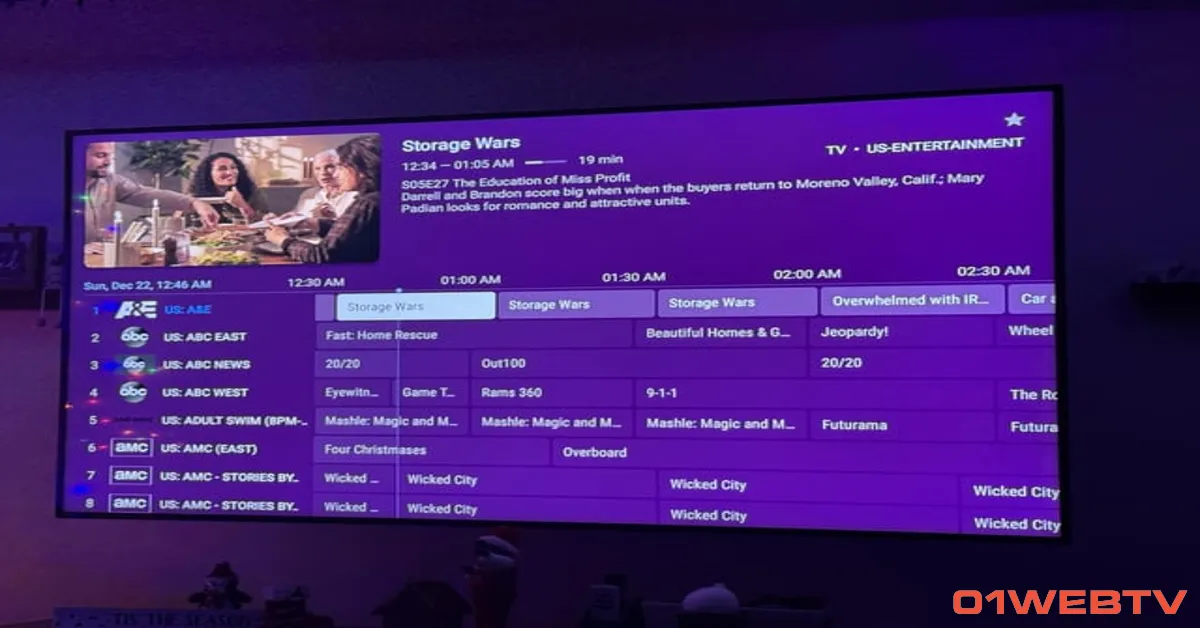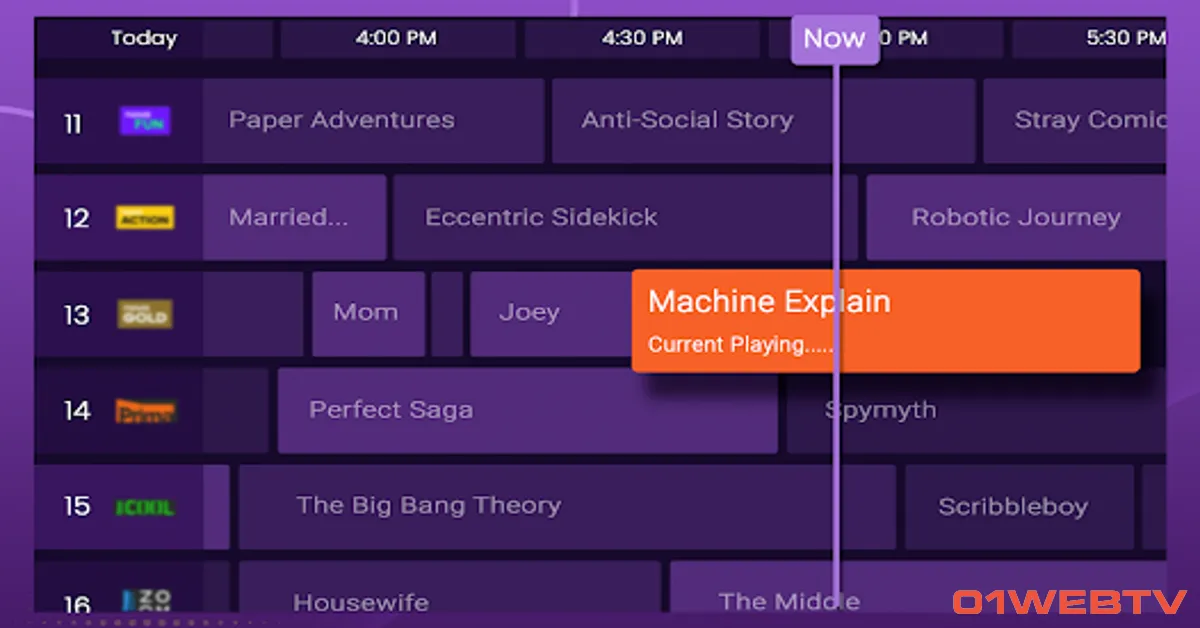In the digital age, IPTV schedules play a crucial role in organizing and delivering television content to viewers. IPTV, or Internet Protocol Television, refers to the delivery of television content over the internet rather than traditional cable or satellite methods. This innovative technology allows users to access a wide range of channels and programs at their convenience, making it a popular choice for modern viewers.
Having a well-structured IPTV schedule is essential for both providers and users. Providers need to ensure that their content is organized efficiently to attract and retain viewers, while users rely on schedules to plan their viewing preferences and discover new programs. By offering a diverse selection of channels and on-demand content, IPTV schedules cater to the varied interests of viewers and enhance their overall viewing experience. In essence, IPTV schedules serve as the backbone of the IPTV platform, offering users a seamless and personalized entertainment experience.
Understanding IPTV Schedule
IPTV, or Internet Protocol Television, refers to the delivery of television content over Internet Protocol (IP) networks. One key component of IPTV is the IPTV schedule, which outlines the programming lineup and timing of shows for viewers. The IPTV schedule is crucial for viewers as it allows them to plan their viewing habits and ensures they do not miss out on their favorite programs.
Having a well-organized IPTV schedule is essential for viewers to make the most of their viewing experience. By knowing when their preferred shows will air, viewers can schedule their time accordingly and avoid missing out on important episodes. This level of convenience and flexibility is a significant advantage of IPTV over traditional television broadcasting.
In comparison to traditional TV schedules, IPTV schedules offer more flexibility and customization options for viewers. With IPTV, viewers can often access on-demand content, allowing them to watch shows at their convenience rather than being tied to a specific broadcast time. This flexibility is especially beneficial for busy individuals who may not always be available to watch TV at designated times.
Furthermore, IPTV schedules can be personalized based on the viewer’s preferences. Viewers can often create profiles and set preferences for specific genres or shows, enabling them to receive tailored recommendations and notifications about upcoming programs. This level of customization enhances the viewing experience and ensures that viewers are always informed about the content that interests them.
Overall, the IPTV schedule plays a crucial role in enhancing the viewing experience for viewers. By providing a well-organized lineup of programs, offering flexibility in viewing options, and enabling personalization, IPTV schedules cater to the diverse needs and preferences of viewers. As the popularity of IPTV continues to grow, having a well-structured and user-friendly IPTV schedule will be key to attracting and retaining viewers in an increasingly competitive media landscape.
Evolution of IPTV Schedule

IPTV schedules have come a long way since the inception of Internet Protocol Television (IPTV). Initially, IPTV services provided linear programming similar to traditional cable or satellite TV. Users had to tune in at specific times to catch their favorite shows, just like they would with a cable box. However, as technology advanced and consumer preferences shifted, IPTV schedules began to evolve.
With the introduction of on-demand content, users gained more control over their viewing habits. They could now watch their favorite shows and movies at their convenience, pausing, rewinding, or fast-forwarding as they pleased. This shift towards on-demand content disrupted traditional broadcasting schedules and paved the way for a more personalized viewing experience.
Moreover, the emergence of smart TVs, streaming devices, and mobile apps further revolutionized IPTV schedules. Viewers could now access their favorite IPTV services on a variety of devices, allowing them to watch content anytime, anywhere. This accessibility led to a rise in binge-watching culture, where viewers could consume entire seasons of shows in one sitting.
Looking ahead to the future, the semantic keyword “IPTV schedule 2025″ offers a glimpse into what the next evolution of IPTV schedules may entail. With advancements in artificial intelligence (AI) and machine learning, IPTV services are expected to offer even more personalized recommendations based on user preferences and viewing habits. This level of customization will not only enhance the user experience but also drive engagement and retention for IPTV providers.
Technological advancements such as 5G connectivity and improved video compression algorithms will also play a significant role in shaping the future of IPTV scheduling. Faster internet speeds and higher quality video streams will enable seamless playback and reduce buffering issues, providing users with a smoother viewing experience.
In conclusion, the evolution of IPTV schedules has been marked by a shift towards on-demand content, personalized recommendations, and increased accessibility across devices. As technology continues to advance, the future of IPTV scheduling looks promising, offering users a more immersive and tailored viewing experience. By leveraging AI, machine learning, and improved connectivity, IPTV providers can create schedules that cater to the individual preferences of each viewer, ultimately redefining the way we consume television content.
Creating an Effective IPTV Schedule
In the world of digital entertainment, IPTV has become increasingly popular due to its convenience and flexibility. One key aspect of optimizing the viewing experience for users is creating an effective IPTV schedule. This involves strategically planning and organizing the content available on the platform to cater to the preferences and interests of the audience.
When creating an IPTV schedule, there are several factors to consider. First and foremost, it is essential to understand the target audience and their viewing habits. By analyzing viewership data and trends, content providers can determine the most popular times and genres for their audience. This information can then be used to curate a schedule that maximizes viewership and engagement.
Another important consideration is the variety of content available on the IPTV platform. A well-rounded schedule should include a mix of genres, formats, and languages to appeal to a diverse audience. By offering a wide range of options, users are more likely to find content that interests them, leading to higher engagement and satisfaction.
Furthermore, the user experience plays a crucial role in the success of an IPTV schedule. To ensure a seamless viewing experience, it is essential to design user-friendly interfaces and intuitive navigation. Clear categorization, search functionalities, and personalized recommendations can help users easily find the content they want to watch. Additionally, providing an IPTV schedule guide can assist users in understanding the programming lineup and discovering new shows and movies.
In conclusion, creating an effective IPTV schedule requires a thoughtful approach that takes into account the needs and preferences of the audience. By analyzing viewership data, offering a diverse range of content, and focusing on user experience, content providers can maximize engagement and satisfaction among users. Incorporating a user-friendly interface and providing a comprehensive IPTV schedule guide can further enhance the viewing experience and make navigating the platform a breeze.
By prioritizing these factors and continuously refining the schedule based on user feedback and data insights, content providers can create a compelling IPTV experience that keeps viewers coming back for more. Ultimately, a well-crafted IPTV schedule can help build a loyal audience and drive success in the competitive digital entertainment landscape.
Utilizing IPTV Schedule Apps
In the modern age of digital streaming and on-demand content, keeping track of your favorite TV shows and channels can be overwhelming. This is where IPTV schedule apps come in handy, providing viewers with a convenient way to access program schedules and plan their viewing experience.
Introduction of IPTV Schedule Apps
IPTV schedule apps are specifically designed to help users navigate through the vast array of channels and content available on Internet Protocol Television (IPTV) services. These apps offer a user-friendly interface that displays program schedules, upcoming shows, and allows users to set reminders for their favorite programs.
Review of Popular IPTV Schedule Apps
There are several popular IPTV schedule apps available in the market that cater to different preferences and needs of viewers. Some of the top-rated apps include IPTV Smarters, Tivimate, and Perfect Player. These apps offer features such as customizable channel lists, EPG (Electronic Program Guide) integration, and the ability to schedule recordings for later viewing.
Benefits of Using an IPTV Schedule App for Viewers
One of the key benefits of using an IPTV schedule app is the convenience it provides to viewers. Instead of manually searching for program schedules on different channels, users can simply open the app and access all the information they need in one place. This saves time and effort, making the viewing experience more enjoyable.
Furthermore, IPTV schedule apps often come with additional features that enhance the overall viewing experience. For example, some apps allow users to customize their channel list, create favorite lists, and even set parental controls to restrict access to certain content. These features give users more control over their viewing preferences and help them tailor their experience to suit their needs.
Another advantage of using an IPTV schedule app is the ability to set reminders for upcoming shows. Users can easily browse through the program guide, select the shows they want to watch, and set reminders so they never miss an episode. This feature is especially helpful for busy individuals who may not have the time to constantly check for program schedules.
In conclusion, IPTV schedule apps are valuable tools that enhance the viewing experience for users of IPTV services. By providing easy access to program schedules, customizable features, and convenient reminders, these apps streamline the process of finding and watching content, making it easier for viewers to enjoy their favorite shows and channels.
Enhancing User Experience with EPG
In the realm of IPTV (Internet Protocol Television), Electronic Program Guides (EPGs) play a crucial role in revolutionizing the way viewers interact with content. Essentially, an EPG is a digital guide that provides users with a detailed list of programs or shows available on various channels at a specific time. This feature allows viewers to navigate through the vast array of content seamlessly, enhancing their overall watching experience.
One of the primary advantages of EPGs in IPTV scheduling is the convenience they offer to users. Instead of aimlessly channel surfing or scrolling through a long list of programs, viewers can simply glance at the EPG to see what’s on and plan their viewing accordingly. This not only saves time but also helps users discover new shows or events they may have otherwise missed.
Moreover, EPGs in IPTV are designed to be user-friendly, with intuitive interfaces that make it easy for viewers to find the content they’re looking for. By displaying program information such as titles, descriptions, genres, and airing times, EPGs enable users to make informed decisions about what to watch next. This level of detail enhances the viewing experience by allowing viewers to tailor their TV-watching to their preferences.
Furthermore, the integration of semantic keyword “IPTV schedule EPG” opens up a world of possibilities for further exploration. By leveraging EPG data, IPTV providers can personalize recommendations based on users’ viewing habits, making it easier for viewers to discover content that aligns with their interests. Additionally, EPGs can be used to schedule recordings, set reminders for upcoming shows, and even explore on-demand content, enhancing the overall user experience.
In conclusion, EPGs play a vital role in enhancing the user experience in IPTV scheduling. By providing users with a comprehensive guide to available programming, EPGs streamline the viewing process, making it easier for viewers to find and enjoy the content they love. With their user-friendly interfaces and customizable features, EPGs make navigating the world of IPTV a breeze, ultimately enriching the way users interact with television content.
Diverse IPTV Schedule Channels
IPTV, or Internet Protocol Television, has revolutionized the way we consume television content. One of the key aspects of IPTV that sets it apart from traditional cable or satellite TV is the diverse range of channels available on its schedules.
Importance of Offering a Diverse Range of Content
The importance of offering a diverse range of content on IPTV channels cannot be overstated. Viewers today have increasingly diverse tastes and interests, and it is crucial for IPTV providers to cater to this diversity. By offering channels that cater to a wide range of demographics, interests, and preferences, IPTV providers can attract and retain a larger audience base.
Examples of Popular IPTV Schedule Channels and Their Unique Offerings
One of the most popular IPTV schedule channels is ESPN, which offers a wide range of sports content, including live games, analysis, and commentary. ESPN caters to sports fans of all kinds, from football and basketball to tennis and golf. Another popular IPTV channel is National Geographic, which offers viewers a diverse range of documentaries and educational programming on science, nature, history, and culture.
For those interested in news and current events, CNN is a go-to IPTV channel. With 24/7 news coverage, CNN keeps viewers informed about the latest developments around the world. On the other end of the spectrum, Food Network is a popular IPTV channel for food enthusiasts, offering cooking shows, competitions, and culinary adventures.
In addition to these mainstream channels, IPTV also offers a wide range of niche channels catering to specific interests and demographics. For example, there are IPTV channels dedicated to gaming, fashion, travel, and even niche sports like surfing and skateboarding. By offering such a diverse range of channels, IPTV providers ensure that there is something for everyone in their programming lineup.
In conclusion, the diverse range of channels available on IPTV schedules plays a crucial role in attracting and retaining viewers. By offering channels that cater to a wide range of interests and demographics, IPTV providers can ensure that there is something for everyone in their programming lineup. Whether you’re a sports fan, a foodie, a news junkie, or a niche enthusiast, IPTV has something to offer for everyone.
Real-Time IPTV Schedule Updates

In the fast-paced world of television and media consumption, keeping viewers engaged and informed is crucial. This is where real-time IPTV schedule updates play a significant role. By providing viewers with up-to-the-minute information on program schedules, IPTV providers can ensure that audiences stay tuned in and engaged.
Dynamic scheduling is a key feature that sets IPTV apart from traditional television broadcasting. With the ability to update schedules in real-time, IPTV providers can make last-minute changes, add new content, or reschedule programming without disrupting the viewing experience. This flexibility not only benefits viewers by keeping them informed of any changes but also allows providers to adapt to changing viewer preferences and trends.
The impact of semantic keyword “IPTV schedule today” on real-time programming cannot be understated. By optimizing schedules and programming based on popular search terms like “IPTV schedule today,” providers can attract more viewers and increase engagement. By incorporating these keywords into their real-time updates, IPTV providers can ensure that their content is easily discoverable by audiences searching for programming to watch.
Furthermore, real-time IPTV schedule updates can also help providers capitalize on trending topics or events. By quickly updating schedules to include relevant content based on current events or popular trends, providers can attract viewers who are looking for up-to-date coverage or information on specific topics. This not only enhances viewer engagement but also positions IPTV providers as a reliable and timely source of information.
In conclusion, real-time IPTV schedule updates are essential for keeping viewers engaged, informed, and satisfied with their viewing experience. By leveraging dynamic scheduling, optimizing content with relevant keywords like “IPTV schedule today,” and staying on top of trending topics, IPTV providers can attract more viewers, increase engagement, and differentiate themselves in a crowded media landscape.
Conclusion
IPTV schedules play a crucial role in the digital landscape, providing viewers with a structured guide to access their favorite content easily. In today’s fast-paced world, where on-demand entertainment is at its peak, IPTV schedules serve as a convenient tool for users to plan their viewing preferences. By offering a curated list of programs, movies, and series, IPTV schedules enhance the overall viewing experience and help users discover new content that aligns with their interests. As we navigate through the ever-evolving entertainment industry, the main keyword “IPTV schedule” remains at the forefront of modern entertainment, guiding viewers through the vast array of options available at their fingertips. Embracing IPTV schedules not only simplifies the viewing process but also enriches it by bringing personalized and tailored content recommendations to the viewers.

